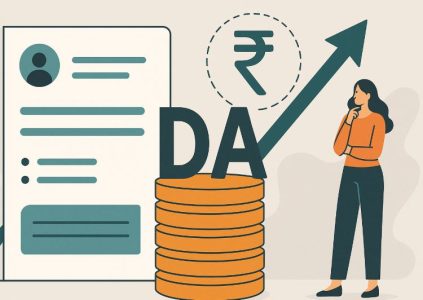For millions of central government employees and pensioners across India, the 8th Pay Commission is not just a bureaucratic process but a matter of livelihood and financial security.
I remember a friend who has served over two decades in government service telling me, “It’s not just about the hike; it’s about feeling valued after years of hard work.”
As the government gears up for the 8th Central Pay Commission (CPC), conversations in homes, offices, and media circles are filled with questions, expectations, and hopes.
This blog explores all the latest news, facts, and analysis surrounding the 8th Pay Commission, including the expected date, fitment factor, salary hike, and key takeaways from parliamentary discussions and expert reports as of 2025. Let’s break it down to understand what lies ahead.
What is the 8th Pay Commission?

The 8th Central Pay Commission is a government-appointed body tasked with reviewing and recommending changes to the salary structure and pensions of central government employees. Historically, such commissions are set up every 10 years to address economic changes, inflation, and employee demands.
The 7th Pay Commission, which came into effect on January 1, 2016, introduced significant changes, including a 14.3% salary hike. Now, the 8th Pay Commission is expected to follow a similar overhaul, but with some important differences.
Why It’s Important?
- Direct impact on 3.3 million central government employees and pensioners
- Influences state government pay revisions
- Triggers ripple effects across the economy, especially in consumption
- Determines government expenditure and fiscal planning
For Grade C employees, who make up nearly 90% of the central workforce, the changes will deeply affect their household incomes and purchasing power.
8th Pay Commission Latest News in 2025: What Has Been Announced So Far?
In July 2025, the Lok Sabha took up the much-anticipated discussion on the constitution of the 8th CPC. The Finance Ministry was expected to provide updates on the Commission’s formation, notification, and timeline.
Parliamentary Updates
MPs Shri T.R. Baalu and Shri Anand Bhadauria posed key questions, including:
- Has the government officially notified the 8th CPC?
- What are the reasons behind any delay?
- When will the chairperson and members be appointed?
- What is the estimated implementation timeline for the new pay scales?
The Finance Ministry acknowledged that the 8th CPC was announced in January 2025 but procedural delays had slowed formal notifications. Sources suggest that appointments are likely to be announced by late 2025, with recommendations expected by late 2026.
This has caused a mix of anticipation and anxiety among employees and unions, who are demanding clarity.
How Much Salary Hike Can Central Government Employees Expect?

One of the most awaited details is the size of the salary hike under the 8th Pay Commission.
Effective Salary Hike
According to Kotak Institutional Equities, the effective salary hike is likely to be around 13%, slightly lower than the 14.3% hike provided by the 7th CPC. This figure considers the resetting of the dearness allowance (DA) to zero when the new pay structure is implemented.
Comparison of Salary Growth
| Component | 7th CPC | 8th CPC (Expected) |
| Fitment Factor | 2.57 | 1.8 |
| Effective Salary Hike (%) | 14.3% | 13% |
| Minimum Basic Pay (Rs) | 18,000 | 32,000 (approx) |
| DA at Time of Implementation | ~55% | Reset to 0 |
While the fitment factor of 1.8 technically means multiplying the basic pay by 1.8, the real wage hike is more modest due to the DA reset.
What is the Expected Fitment Factor Under 8th CPC?
The fitment factor is the multiplier used to calculate new salaries from the existing basic pay.
Detailed Breakdown
- Current basic pay: Rs 18,000
- Fitment factor proposed: 1.8
- New basic pay: Rs 18,000 x 1.8 ≈ Rs 32,000
However, since the DA of 55% will reset to zero after the hike, the real increase in take-home pay will be around 13%, not 80% or 180% as the multiplier might suggest.
This has raised concerns among employees who were expecting a stronger revision.
How Will Minimum Basic Pay Change for Employees?
Let’s break down the minimum pay structure using real examples.
Lower-Grade Employee
- Current basic pay: Rs 18,000
- Current DA (55%): Rs 9,900
- Current gross: Rs 27,900
- Post 8th CPC basic (1.8 factor): Rs 32,000
- Gross after adding new DA (to be reintroduced later): Initially Rs 32,000
Mid-Level Employee
- Current basic pay: Rs 50,000
- Current DA (55%): Rs 27,500
- Current gross: Rs 77,500
- Post 8th CPC basic: Rs 90,000
- Effective increase, after accounting for DA reset: ~13%
This detailed breakdown shows that while the headline numbers look big, the real increase after factoring in allowances is more moderate.
What is the Impact on Dearness Allowance and Allowances?

The DA is a vital component of government salaries, adjusted every six months to combat inflation.
Expected DA Movement
- Current DA: ~55% of basic pay
- By implementation time: Expected to cross 60%
- After 8th CPC: Reset to 0
Allowances will also be reviewed under the 8th CPC, but experts believe the initial few months post-implementation will see employees adjusting to the DA reset before the periodic hikes restart.
Who Will Benefit the Most From the 8th Pay Commission?
The majority of the financial benefits are expected to flow to Grade C employees.
Why Grade C?
- They make up 90% of the central government workforce.
- Higher marginal propensity to consume, meaning they are more likely to spend salary increases, boosting the economy.
- Larger proportion of paychecks is made up of fixed salary and allowances compared to top grades.
Grade-Wise Employee Breakdown
| Grade | % of Workforce |
| Grade A | 5% |
| Grade B | 5% |
| Grade C | 90% |
What Financial Burden Will the 8th CPC Place on the Government?
Kotak Institutional Equities estimates the total fiscal burden at around Rs 2.4–3.2 lakh crore, which is significantly higher than the Rs 1.02 lakh crore impact of the 7th CPC.
This raises important fiscal management questions, as the government balances employee needs with broader economic responsibilities.
When Will the Revised Pay Scales Be Implemented?

- Announcement: January 2025
- Notification & Appointments: Late 2025
- Recommendations Finalized: 2026
- Effective Date: Likely January 2026
The delay has been attributed to administrative reasons, but employees and pensioners are closely watching the Lok Sabha and Finance Ministry for timely updates.
What Are the Key Questions Raised in Parliament About the 8th CPC?
MPs have formally asked the government to address:
- Whether notification has been issued
- Reasons for any delay
- Appointment timeline of chairperson and members
- Clarity on terms of reference, including salary, allowances, and pensions
These questions reflect the widespread public and political interest in the Commission.
What Should Employees Do Now?
While the process unfolds, employees should:
- Stay updated through official announcements
- Engage with staff unions or associations
- Prepare for potential changes in pay structure
- Understand the implications of DA reset and future hikes
Unions are already pushing for transparency and timely implementation, and employees are encouraged to follow these discussions closely.
Conclusion
The 8th Pay Commission is more than just numbers on paper. It represents the hopes, challenges, and futures of over 3 million employees and pensioners across India.
As Parliament debates, experts analyze, and employees wait, one thing is clear: this Commission will shape financial lives for the next decade.
While the estimated 13% hike may feel underwhelming to some, the broader impact, especially for Grade C employees, is significant. As 2025 moves forward, all eyes are on the Finance Ministry for the next big announcements.
FAQs
What is the fitment factor expected under the 8th Pay Commission?
The fitment factor is expected to be 1.8, lower than the 2.57 factor of the 7th CPC, leading to an effective salary hike of around 13%.
How much will the minimum basic salary increase?
The minimum basic salary is expected to increase from Rs 18,000 to approximately Rs 32,000 under the new recommendations.
When will the 8th Pay Commission be implemented?
The implementation is likely to happen in January 2026, following the Commission’s recommendations.
Why is the effective salary hike lower despite a higher multiplication factor?
Because the dearness allowance, currently at 55%, will reset to zero after the new pay scales are applied.
Who will benefit the most from the 8th Pay Commission?
Grade C employees, who make up about 90% of the workforce, are expected to gain the most in relative terms.
What is the estimated cost of the 8th CPC on the government?
The estimated fiscal burden is between Rs 2.4–3.2 lakh crore, significantly higher than the 7th CPC’s cost.
What key issues were raised in Parliament regarding the 8th CPC?
MPs questioned the notification status, delay reasons, appointment timeline, and the terms of reference.




